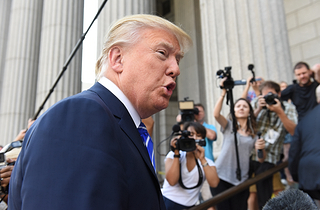 While holding a campaign event at the New Spirit Revival Center, a largely black church in Cleveland Heights, Ohio, Donald Trump made an interesting campaign announcement according to a firsthand account from NPR’s Sarah McCammon:
While holding a campaign event at the New Spirit Revival Center, a largely black church in Cleveland Heights, Ohio, Donald Trump made an interesting campaign announcement according to a firsthand account from NPR’s Sarah McCammon:
Back in May, the Trump campaign released a list of 11 names he was considering as potential Supreme Court appointees to replace the recently deceased Antonin Scalia if he’s elected president. Consisting entirely of federal judges and state supreme court judges, they are (in alphabetical order by last name):
- Steven Colloton, United States Court of Appeals for the Eighth Circuit (Iowa)
- Allison H. Eid, Associate Justice of the Colorado Supreme Court
- Raymond Gruender, United States Court of Appeals for the Eighth Circuit (Missouri)
- Thomas Hardiman, United States Court of Appeals for the Third Circuit (Pennsylvania)
- Raymond Kethledge, United States Court of Appeals for the Sixth Circuit (Michigan)
- Joan Larsen, Associate Justice of the Michigan Supreme Court
- Thomas Rex Lee, Associate Chief Justice of the Utah Supreme Court
- William H. Pryor Jr., United States Court of Appeals for the Eleventh Circuit (Alabama)
- Diane S. Sykes, United States Court of Appeals for the Seventh Circuit (Wisconsin)
- David Stras, Associate Justice of the Minnesota Supreme Court
- Don Willett, Associate Justice of the Supreme Court of Texas
The campaign has not yet named any of the additional nine picks. Trump’s announcement comes just six days after a report (which the campaign denied) surfaced saying that he plans to nominate controversial billionaire Peter Thiel for the vacancy. While Thiel does have a law degree, he abandoned practice in 1993 and went on to make his fortune by co-founding PayPal and data analytics firm Palantir as well as being being the first major investor in Facebook. As of late, he’s best known for funding Hulk Hogan’s invasion of privacy lawsuit and various other cases against Gawker Media as revenge for posts about him and his friends.
There are no specific requirements for being a Supreme Court justice, though all past justices have had legal training, even if informal. James F. Byrnes, who served from 1941-1942, was self-taught before passing the bar when he was 23 years old, while Robert H. Jackson (1941-1954) did not have a proper law degree due to the age requirements at the time. Of course, if Thiel was chosen, he wouldn’t break the post-Jackson streak since he does have a law degree.
[Photo: Shutterstock]